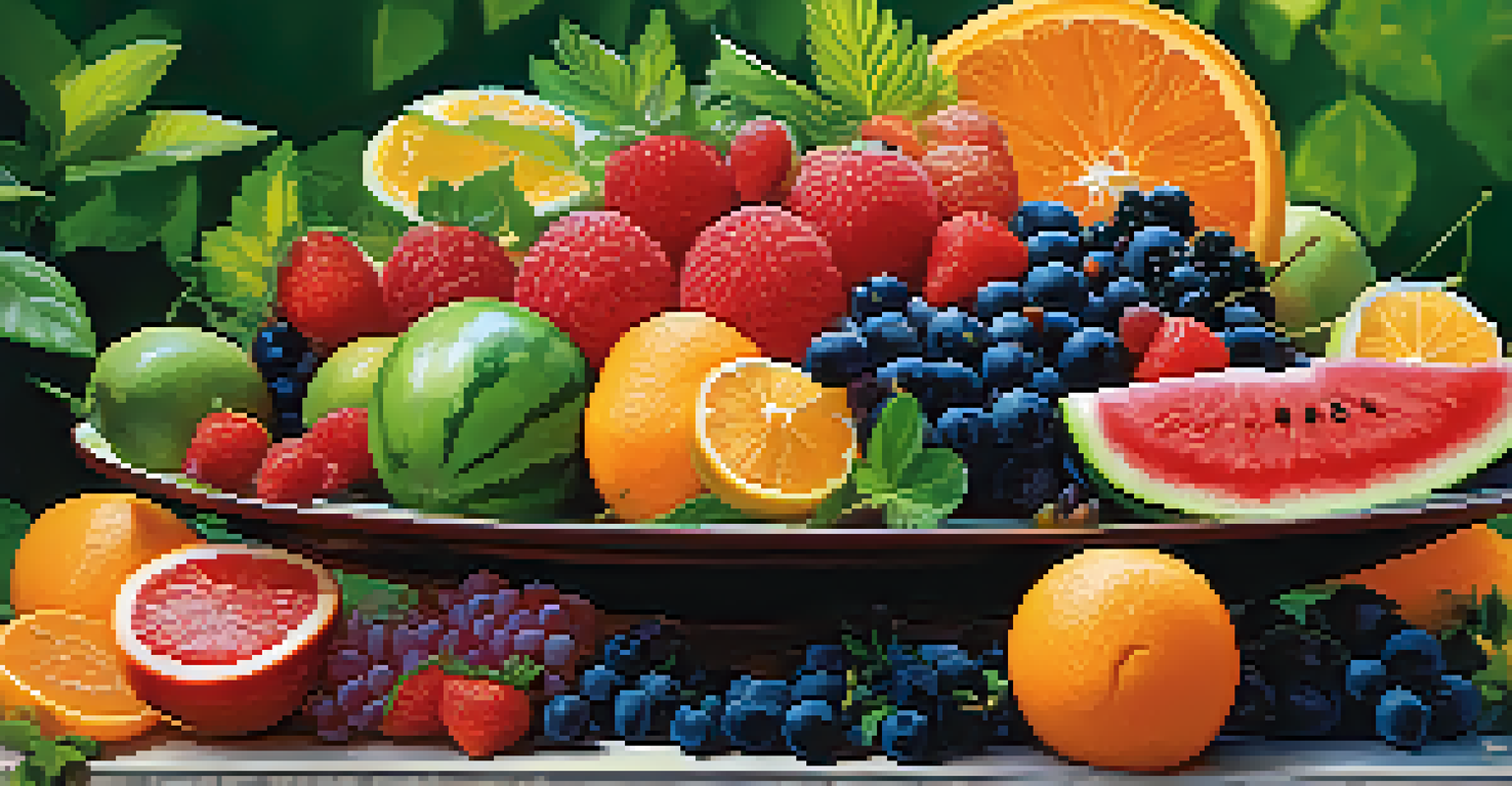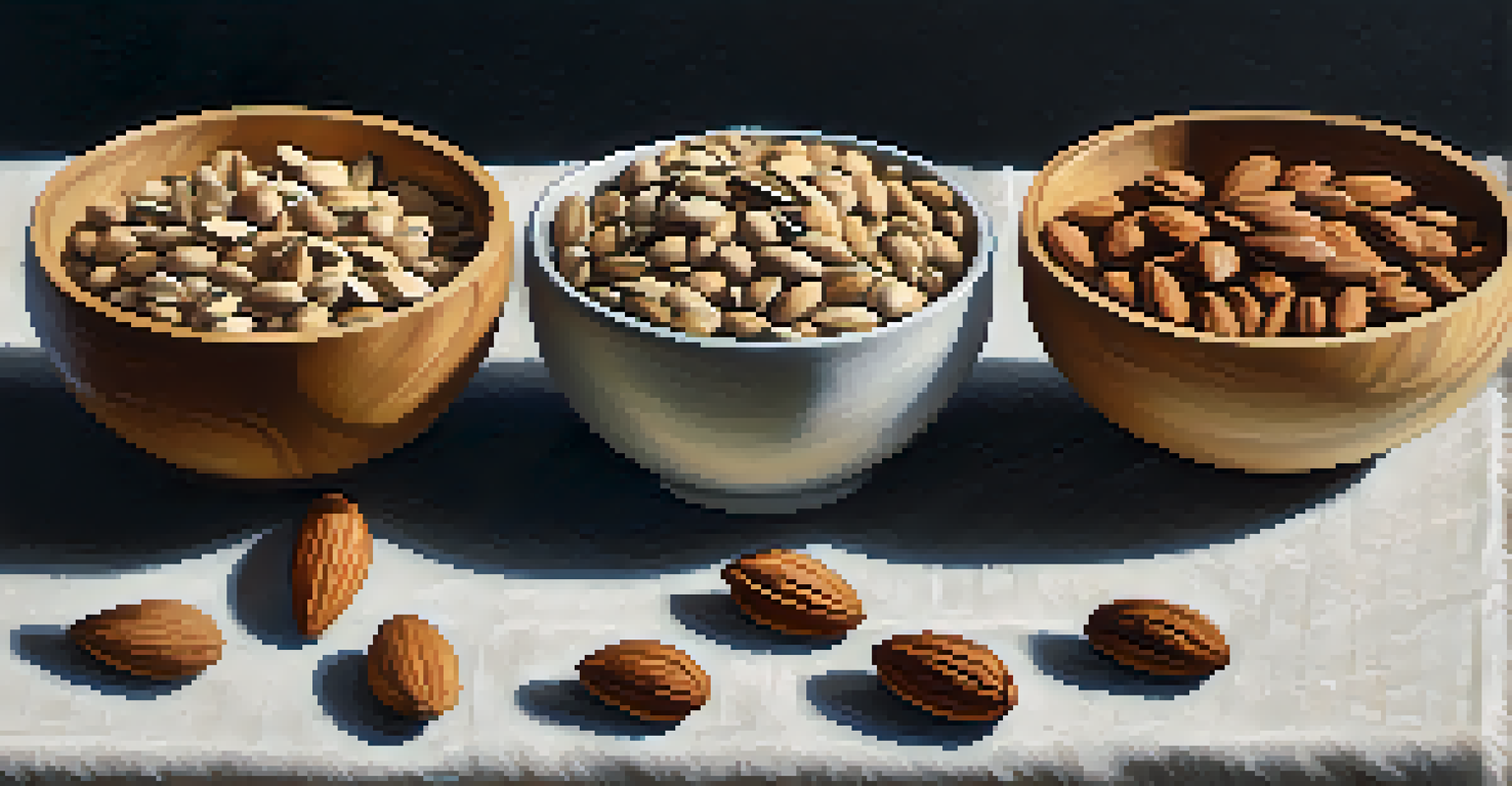Vitamins and Minerals: Essentials for Raw Food Dieters

Understanding the Raw Food Diet Basics
The raw food diet is all about consuming uncooked and unprocessed foods, primarily fruits, vegetables, nuts, and seeds. This approach aims to preserve the natural enzymes and nutrients that cooking can destroy. By focusing on these whole foods, dieters often report increased energy, better digestion, and a clearer mind. However, while a raw food diet can be incredibly nutritious, it’s essential to ensure that you’re getting all the necessary vitamins and minerals to maintain overall health.
Let food be thy medicine and medicine be thy food.
One of the key benefits of a raw food diet is its emphasis on nutrient-rich foods. Fruits and vegetables are packed with vitamins A, C, and K, along with important antioxidants that help fight free radicals in the body. But, it’s not just about eating more raw foods; it’s about understanding what your body needs to thrive. Without careful planning, certain nutrients can be lacking, leading to potential deficiencies.
As you embark on this journey, remember that knowledge is power. Understanding which vitamins and minerals are crucial for your health can help you create balanced meals that meet your nutritional needs. This article will explore the essential nutrients for raw food dieters, ensuring you can enjoy the benefits of your diet while remaining healthy and vibrant.
Key Vitamins for Raw Food Enthusiasts
Vitamins are organic compounds that play vital roles in various bodily functions. For raw food dieters, certain vitamins like B12, C, and D are particularly important. Vitamin B12, found mainly in animal products, is crucial for nerve function and the production of DNA and red blood cells. Since it's often lacking in a raw food diet, consider fortified foods or supplements to ensure you’re getting enough.

Vitamin C is abundant in fruits and vegetables, especially in citrus fruits, bell peppers, and strawberries. It acts as an antioxidant, boosting your immune system and aiding in the absorption of iron from plant foods. Meanwhile, vitamin D, often known as the 'sunshine vitamin', can be trickier to obtain in a strict raw diet. Spending time outdoors and considering fortified foods can help maintain adequate levels.
Nutrient-Rich Foods Matter
A raw food diet emphasizes consuming uncooked fruits, vegetables, nuts, and seeds to boost energy and improve digestion, but it requires careful planning to avoid nutrient deficiencies.
As you plan your meals, aim to include a variety of colorful fruits and vegetables. This not only makes your plate visually appealing but also ensures a broader range of vitamins. For instance, a vibrant salad loaded with spinach, tomatoes, and citrus can be a delicious way to boost your vitamin intake while enjoying the raw food lifestyle.
Essential Minerals for Optimal Health
Minerals are inorganic elements that contribute to various bodily functions, including bone health, nerve signaling, and muscle contraction. Key minerals to focus on for raw food dieters include calcium, iron, and magnesium. Calcium, essential for bone health, can be found in leafy greens, almonds, and sesame seeds. Incorporating these foods into your diet can help maintain strong bones and teeth.
The food you eat can either be the safest and most powerful form of medicine or the slowest form of poison.
Iron is another vital mineral, especially for those following a plant-based diet. While it's commonly associated with red meat, many raw food sources like lentils, chickpeas, and spinach are rich in iron. Pairing these iron-rich foods with vitamin C sources, such as bell peppers or lemon juice, can enhance absorption and combat potential deficiencies.
Magnesium plays a crucial role in muscle and nerve function, as well as energy production. Raw nuts and seeds, such as pumpkin seeds and almonds, are excellent sources of magnesium. Including a variety of these foods in your diet can help support your overall health and well-being, ensuring you're getting the essential minerals your body needs.
The Importance of Omega-3 Fatty Acids
While not technically a vitamin or mineral, omega-3 fatty acids are essential for overall health, particularly in a raw food diet. These healthy fats support brain function, reduce inflammation, and promote heart health. Unfortunately, omega-3s are primarily found in fish and certain plant sources, which can be limited in a raw diet. Flaxseeds, chia seeds, and walnuts are excellent plant-based sources of omega-3 fatty acids.
Incorporating these foods into your meals can help ensure you’re getting enough of these vital fats. For example, adding ground flaxseed to your smoothies or making chia pudding can be delicious and nutritious ways to boost your omega-3 intake. Additionally, consider using hemp oil or flaxseed oil as salad dressings to enhance your fat profile.
Essential Vitamins and Minerals
Key nutrients like vitamins B12, C, D, and minerals such as calcium and iron are crucial for raw food dieters to maintain overall health and vitality.
Remember, balancing your omega-3 and omega-6 fatty acids is essential for optimal health. While many diets can be high in omega-6s, focusing on omega-3-rich foods can help create a healthier ratio. By being mindful of your fat sources, you can support your body’s needs while enjoying the benefits of a raw food diet.
Hydration: The Overlooked Essential
When discussing vitamins and minerals, hydration often gets overlooked, yet it’s crucial for raw food dieters. Many fruits and vegetables have high water content, making them great for staying hydrated. For instance, cucumbers, watermelon, and oranges not only provide essential nutrients but also contribute to your daily fluid intake. Staying hydrated helps with digestion and nutrient absorption, which is vital on a raw food diet.
However, it's important not to rely solely on food for hydration. Drinking water throughout the day is essential, especially if you're consuming a lot of fiber-rich foods. Adequate hydration supports healthy digestion and can prevent common digestive issues that some raw food dieters experience. Consider herbal teas or infused water for added flavor and hydration.
Incorporating a variety of hydrating foods and beverages can help you feel your best while on a raw food diet. Pay attention to your body's signals, and drink water regularly. By prioritizing hydration, you're not only supporting your physical health but also enhancing your overall experience on this vibrant diet.
Meal Planning for Nutritional Balance
Meal planning is key to ensuring you’re meeting your nutritional needs on a raw food diet. By taking the time to plan your meals, you can incorporate a variety of fruits, vegetables, nuts, and seeds that provide essential vitamins and minerals. Consider creating a weekly menu that includes different colors and types of produce to maximize nutrient diversity. This colorful approach not only keeps your meals exciting but also supports a well-rounded diet.
Additionally, consider prepping some of your meals in advance. Having ready-to-eat snacks, like sliced veggies or fruit, can help you avoid reaching for less nutritious options when hunger strikes. Meal prepping can also make it easier to stick to your raw food principles, ensuring you always have healthy options on hand.
Hydration Supports Well-Being
Staying hydrated is vital for raw food enthusiasts, as many fruits and vegetables provide water content, but drinking adequate water throughout the day is equally important.
As you plan your meals, keep an eye on nutrient balance. Use a food diary or an app to track your intake and make adjustments as needed. This can be especially helpful in identifying any potential deficiencies and making informed choices to support your health while enjoying the raw food lifestyle.
Listening to Your Body: A Personal Journey
Every individual’s body is unique, and what works for one person on a raw food diet may not work for another. It's important to listen to your body’s signals as you adjust to this style of eating. Pay attention to how you feel after meals – are you energized, or do you feel sluggish? These cues can provide insight into whether you’re getting the right balance of nutrients.
Consider keeping a journal to track your experiences and how different foods affect your energy levels and overall well-being. This can be a valuable tool for identifying any deficiencies or food sensitivities that may arise. Remember, it’s okay to experiment and make changes based on your body’s feedback.

Ultimately, the goal of a raw food diet is to nourish your body and feel your best. By staying attuned to your needs and making informed dietary choices, you can enjoy the benefits of this vibrant lifestyle while ensuring you’re meeting your nutritional requirements. Embrace the journey and celebrate your progress along the way!